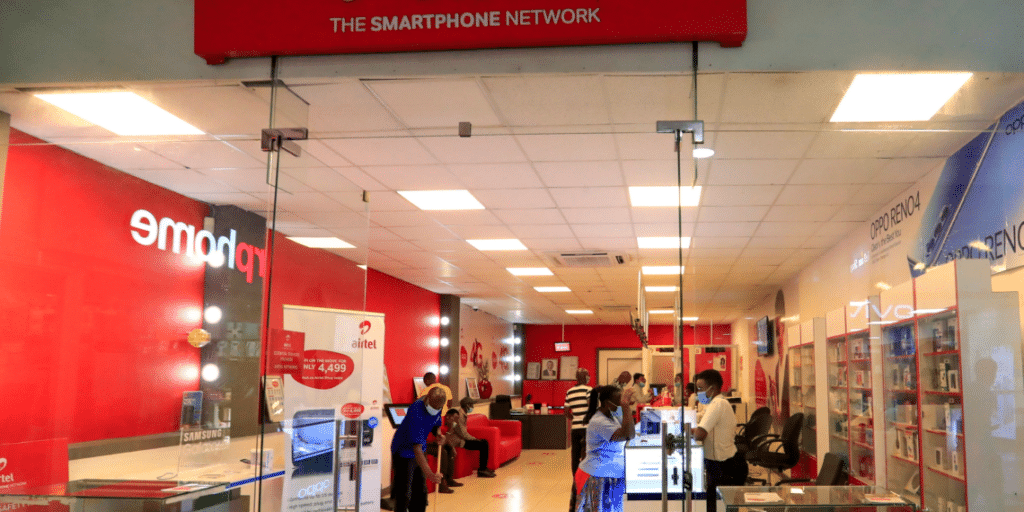Olá,
Victoria from Techpoint here,
Here’s what I’ve got for you today:
- Jumia’s still losing money, but it’s losing less
- How to outplay regulators as a founder
- Airtel mints $145B via mobile money
Jumia’s revenue dropped by 26% to $36.3 million in Q1 2025

Jumia, Africa’s eCommerce platform, just shared its Q1 2025 financials, and while the numbers look rough on the surface, there are some promising signs. Revenue dropped by 26% to $36.3 million, mostly because of a slump in corporate sales in Egypt and currency troubles in key markets.
But if you strip out currency effects, the decline isn’t as bad — about 18%. More importantly, Jumia’s consumer-focused sales grew, showing some real underlying strength.
The company’s operating loss widened to $18.7 million, and adjusted EBITDA loss hit $15.7 million, but the good news is that its loss before inc0me tax improved significantly, dropping to $16.5 million from over $39 million the year before. This big jump was mainly due to a sharp reduction in finance costs, thanks to more stable exchange rates in Nigeria and Egypt compared to last year.
Operationally, Jumia is seeing real momentum. Orders for physical goods jumped by 21% — the highest in two years — while active customers rose by 15%. Their move into rural areas is paying off, and Nigeria, one of its biggest markets, saw orders climb by 22%.
JumiaPay is also holding steady. The platform processed 2 million transactions, and digital payments are on the rise, covering 28% of total sales. The company’s logistics are becoming more efficient too, with fulfilment costs per order falling by 14%. Marketing spend was also down by 17% thanks to a smarter strategy focusing on organic channels and CRM.
Even with all this, Jumia’s share price slipped by nearly 5%, settling at $2.40. Investors seem cautious, likely due to Africa’s ongoing economic uncertainties. Still, Jumia has raised its guidance for the rest of 2025, projecting GMV to hit up to $830 million and orders to grow by as much as 25%.
Join 30,000 other smart people like you
Get our fun 5-minute roundup of happenings in African and global tech, directly in your inbox every weekday, hours before everyone else.
Looking further ahead, Jumia expects to cut its pre-tax loss to $25–30 million in 2026 and break even by Q4 of that year. Full-year pr0fitability is now the goal for 2027. It’s not quite there yet, but Jumia is laying the groundwork to finally turn the corner.
How to outplay regulators as a founder

Let’s face it, navigating regulation isn’t exactly a founder’s dream. It can feel like a roadblock, slowing things down and adding stress when you’re already juggling a lot. But the truth? Ignoring regulations can be way more costly than simply playing by the rules. We’ve seen it all: blocked acc0unts, revoked licences, heavy fines, and even shutdowns. It’s not pretty.
That’s why learning how to work with regulators — not around them — isn’t just helpful anymore. It’s a survival skill. And if you do it right, regulation can become your competitive edge, giving you a moat that keeps others out and earns trust from users, investors, and partners.
That’s exactly what Ifunanya Anamelechi will be teaching in her masterclass at the Lagos Startup Expo 2.0 this June. As the VP of Legal & Compliance at Zone, she knows a thing or two about working within complex legal systems. Her experience spans banking, fintech, and telecoms. So she’s dealt with the tricky stuff firsthand.
Her session, “Regulatory Advantage: Winning Over Governments and Regulators,” will break down how to turn compliance into a business strategy. You’ll learn how to approach regulators with confidence, protect your startup from legal chaos, and use compliance to your benefit.
Also at the Expo, we’ve got Douglas Kendyson, the founder of Selar, showing you how to build a successful business without raising a dime. His masterclass, “An African Founder’s Guide to Bootstrapping,” is all about building lean, staying scrappy, and growing something real even when funding isn’t knocking.
Douglas has done it himself. He took Selar from zero to over $10 million in payouts to digital creators without VC money. If you’re trying to figure out how to get your startup off the ground with little to no capital, you won’t want to miss this. VIP Masterclass tickets are limited, so grab yours now at lagosstartupexpo.com.
Airtel mints $145B via mobile money

Airtel Africa had a busy year, and it shows in the numbers. The company’s mobile money business hit a whopping $145 billion in annualised transaction value for the year ending March 31, 2025. That’s a 34% jump in constant currency, showing more people are trusting their phones with their cash. The mobile money user base also grew by 17.3%, now standing at 44.6 million users across the continent.
Total revenue for the year came in at $4.96 billion, up by 21.1% in constant currency. But because of currency hits, especially the naira devaluation in Nigeria, the reported revenue actually dipped slightly by 0.5%. It’s a classic case of good performance getting overshadowed by forex troubles.
Voice and data services are still bringing in the bucks. Voice revenue rose by 9.8% while data surged by 29.5%, helping mobile services grow 18.8% overall. Mobile money revenue alone climbed by 29.6%, proving that fintech continues to be a golden goose for telcos.
Even with rising fuel prices and Nigeria’s currency drama, Airtel Africa held its ground with a decent $2.3 billion EBITDA and a 46.5% margin. Yeah, that’s a 5.1% drop from last year, but considering the circumstances, they’re not doing too badly.
Nigeria, however, remains the sore spot. Airtel’s revenue there plummeted by 44.2% in reported currency, but in constant terms, it grew 35.8%. Voice and data saw strong growth, but the naira’s crash made it hard to reflect that success on paper. It’s the same pain MTN felt last year with its massive forex losses.
To stay steady, Airtel is now handling most of its debt in local currency — 93.4%, up from 83% last year. This move is part of a broader play to reduce exposure to currency risks. Meanwhile, the company keeps expanding its network and digital infrastructure to serve its 138.5 million subscribers better.
In case you missed it
- Court faults FCCPC’s DStv price probe, says MultiChoice denied fair hearing
What I’m watching
- Why Every Country Is in Debt? And Who Do They Owe?
- This is why we can’t have nice things
Opportunities
- Pitch Friday is today, Friday, May 9, 2025. Register here to attend.
- Want to exhibit or attend the Lagos Startup Expo in June? Visit this website here.
- OmniRetail is hiring an Acc0unt Manager. Apply here
- Airtel is looking for a Business Solutions Manager. Apply here.
- Building a startup can feel isolating, but with Equity Merchants CommunityConnect, you can network with fellow founders, experts, and investors, gaining valuable insights and exclusive resources to help you grow your business. Click here to join.
- Help us make Techpoint better for you! Your feedback shapes what comes next (your responses may potentially save my job. A bit dramatic, but still). It will only take 30 seconds to tell us what works and what doesn’t. Fill it here.
- To pitch your startup or product to a live audience, check out this link.
- Have any fresh products you’d like us to start selling? Check out this link here.
- Flutterwave is hiring to fill in several positions. Apply here.
- Paystack is hiring for several roles. Apply here.
- Moniepoint is hiring for several roles. Apply here.
- Follow Techpoint Africa’s WhatsApp channel to stay on top of the latest trends and news in the African tech space here.
Have a fun weekend!
Victoria Fakiya for Techpoint Africa.
